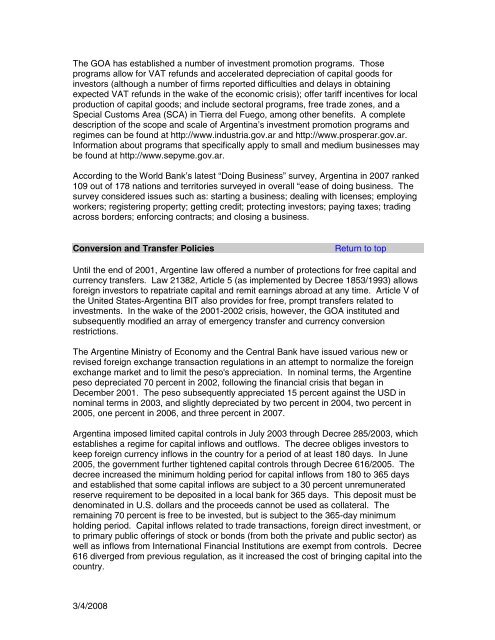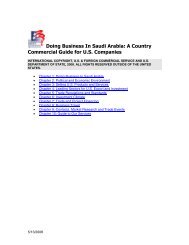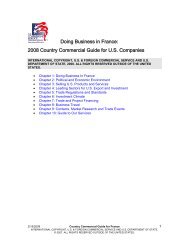Create successful ePaper yourself
Turn your PDF publications into a flip-book with our unique Google optimized e-Paper software.
The GOA has established a number of investment promotion programs. Those<br />
programs allow for VAT refunds and accelerated depreciation of capital goods for<br />
investors (although a number of firms reported difficulties and delays in obtaining<br />
expected VAT refunds in the wake of the economic crisis); offer tariff incentives for local<br />
production of capital goods; and include sectoral programs, free trade zones, and a<br />
Special Customs Area (SCA) in Tierra del Fuego, among other benefits. A complete<br />
description of the scope and scale of <strong>Argentina</strong>’s investment promotion programs and<br />
regimes can be found at http://www.industria.gov.ar and http://www.prosperar.gov.ar.<br />
<strong>In</strong>formation about programs that specifically apply to small and medium businesses may<br />
be found at http://www.sepyme.gov.ar.<br />
According to the World Bank’s latest “<strong>Doing</strong> <strong>Business</strong>” survey, <strong>Argentina</strong> in 2007 ranked<br />
109 out of 178 nations and territories surveyed in overall “ease of doing business. The<br />
survey considered issues such as: starting a business; dealing with licenses; employing<br />
workers; registering property; getting credit; protecting investors; paying taxes; trading<br />
across borders; enforcing contracts; and closing a business.<br />
Conversion and Transfer Policies Return to top<br />
Until the end of 2001, Argentine law offered a number of protections for free capital and<br />
currency transfers. Law 21382, Article 5 (as implemented by Decree 1853/1993) allows<br />
foreign investors to repatriate capital and remit earnings abroad at any time. Article V of<br />
the United States-<strong>Argentina</strong> BIT also provides for free, prompt transfers related to<br />
investments. <strong>In</strong> the wake of the 2001-2002 crisis, however, the GOA instituted and<br />
subsequently modified an array of emergency transfer and currency conversion<br />
restrictions.<br />
The Argentine Ministry of Economy and the Central Bank have issued various new or<br />
revised foreign exchange transaction regulations in an attempt to normalize the foreign<br />
exchange market and to limit the peso's appreciation. <strong>In</strong> nominal terms, the Argentine<br />
peso depreciated 70 percent in 2002, following the financial crisis that began in<br />
December 2001. The peso subsequently appreciated 15 percent against the USD in<br />
nominal terms in 2003, and slightly depreciated by two percent in 2004, two percent in<br />
2005, one percent in 2006, and three percent in 2007.<br />
<strong>Argentina</strong> imposed limited capital controls in July 2003 through Decree 285/2003, which<br />
establishes a regime for capital inflows and outflows. The decree obliges investors to<br />
keep foreign currency inflows in the country for a period of at least 180 days. <strong>In</strong> June<br />
2005, the government further tightened capital controls through Decree 616/2005. The<br />
decree increased the minimum holding period for capital inflows from 180 to 365 days<br />
and established that some capital inflows are subject to a 30 percent unremunerated<br />
reserve requirement to be deposited in a local bank for 365 days. This deposit must be<br />
denominated in U.S. dollars and the proceeds cannot be used as collateral. The<br />
remaining 70 percent is free to be invested, but is subject to the 365-day minimum<br />
holding period. Capital inflows related to trade transactions, foreign direct investment, or<br />
to primary public offerings of stock or bonds (from both the private and public sector) as<br />
well as inflows from <strong>In</strong>ternational Financial <strong>In</strong>stitutions are exempt from controls. Decree<br />
616 diverged from previous regulation, as it increased the cost of bringing capital into the<br />
country.<br />
3/4/2008












